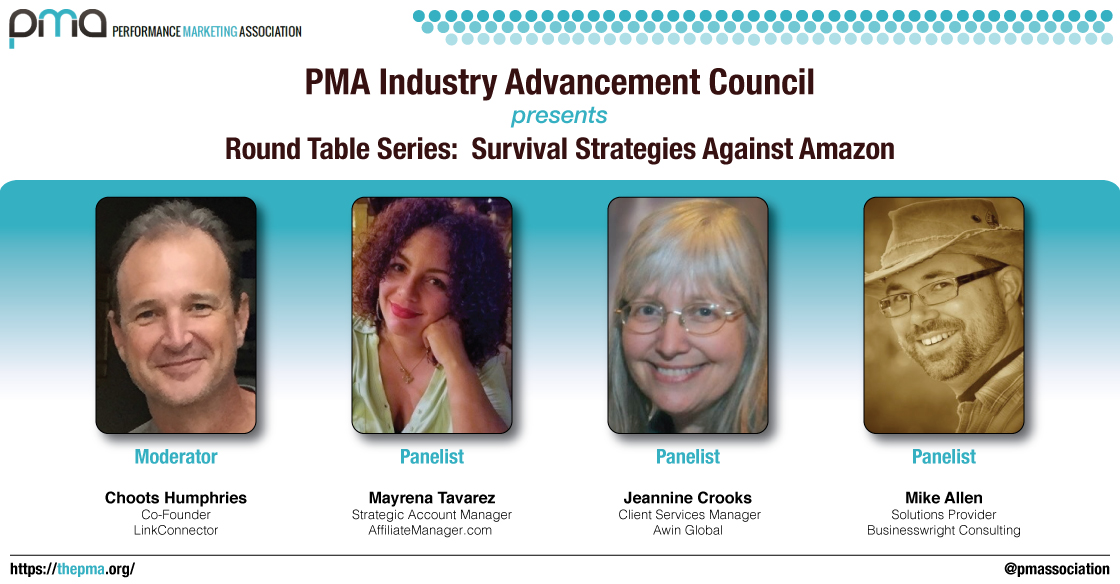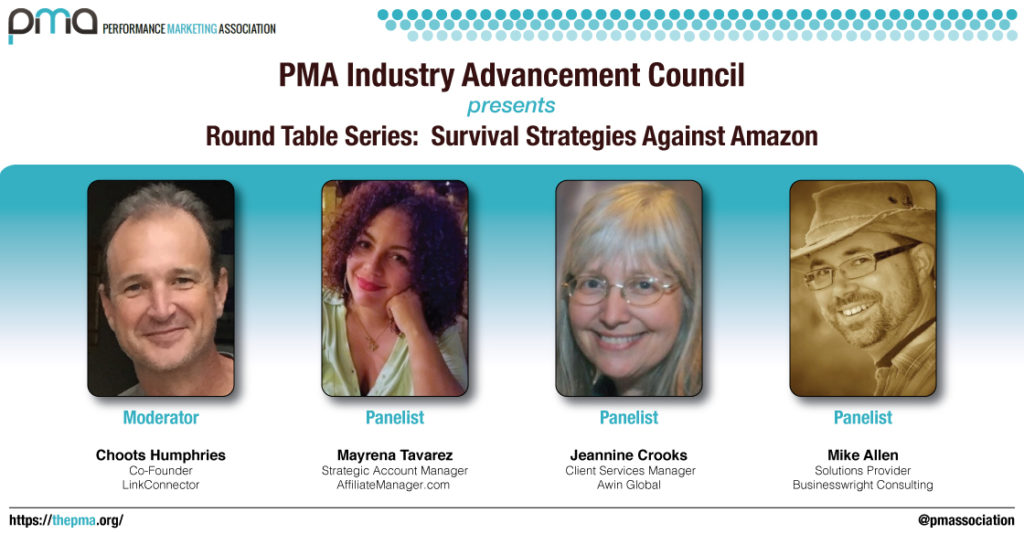
PMA Virtual Round Table: Survival Strategies Against Amazon (Recap and Download)

Thanks to Abby Schaller, ShareASale, for writing up this recap as Chair of the Publisher Recruitment Council.
On Wednesday, March 13th, affiliate marketing industry leaders spent an hour discussing how brands can have strong affiliate programs with the presence of Amazon, and how it directly interacts with our industry.
The discussion was put together by the PMA’s Industry Advancement Council for PMA members only, and the panelists included:
- Choots Humphries, LinkConnector (Moderator)
- Mayrena Tavarez, AffiliateManager.com
- Jeannine Crooks, Awin Global
- Mike Allen, Businesswright Consulting
There’s a lot to think about when it comes to running a successful affiliate program and Amazon should be top of mind. This is both for merchants and affiliates.
Mike Allen started the discussion with some astonishing stats –
- 375 million products live on Amazon
- Over 2 million marketplace sellers and this number continue to grow rapidly
- About 95 million Amazon Prime subscribers
- Around 10,000 US cities with access to 1 day delivery
- 40 Amazon prime aircrafts
- 52% of consumers are starting product search on Amazon and NOT Google
Seemingly nothing looks wrong with Amazon’s model, but panelists were quick to point out that Amazon only has one goal: to sell the product. As long as they are making money, they don’t care how it gets done.
So what do merchants need to bear in mind? Quite a few things. First, SEO optimization won’t work on Amazon, unless merchants are looking to pay a lot of money to be featured on a results page. Therefore, they lose out on clicks.
Secondly, consumers are doing a lot of research on Amazon. So It could take a lot of time and effort to get bad feedback and reviews restored.
Thirdly, merchants can’t control who is selling their product because it’s an open marketplace. Therefore, products can sell at a lower margin.
We also need to think about what can be done to get the sale to take place on the brand’s website. First and foremost, the business needs to think of themselves as just that – a BRAND. As a brand, create something very unique that Amazon doesn’t carry – even if it’s just a certain flavor or color of the product. And remember to build up customer service and rapport.
If a merchant sells a product on Amazon, Amazon will own the customer and have the control. There is no way to re-target, upsell, get stats, figure out buyer personas, etc. By working with networks, merchants can establish partnerships with affiliates that help them with all those items.
Here are a few ways merchants can build a program to compete with Amazon:
- Maintain competitive commission
- Reach out and educate affiliates on why it’s better to take the relationship direct
- Offer discounts
- Make prices appealing
- Ensure the website (desktop and mobile) navigation is easy and simple to use
- Provide support to affiliates
- Provide additional product details the affiliates can share with their readers
On the affiliate side, Amazon only offers a 24 hour cookie window and much lower commissions. Their average commission rate is 4%, in comparison to working directly with a program on a network where they payout anywhere between 10%-20% on average. The average cookie window for a program working with a network is about 30 days. There is a lot of money being left on the table.
Also, networks truly care about the needs of their affiliates. Networks create special technologies around the wants of affiliates. Amazon can remove affiliates from their program and the affiliate has to start all over again. When working with a network and having a dedicated contact, those same issues could be resolved quicker and easier.
For the final point made, panelists want affiliate marketers to remember that not everyone likes shopping on Amazon and not everyone likes promoting Amazon, which is just another reason why it’s beneficial to work with networks.
Log in or Join the PMA to get access to this recording!

 Follow
Follow